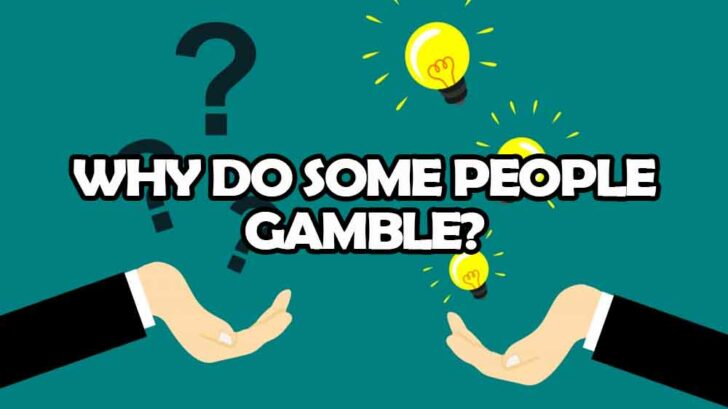
Why do people gamble? Some people do it more than others, but it exists across all cultures. The reason for it can be tough to pin down, both psychologically and economically.
If you ask people, they’ll give you a variety of reasons. However, much of the discourse around responsible gambling tends to take a reductive view, splitting the motivations into two categories. Gambling for pure entertainment is more or less the only acceptable reason to do so. All other motivations are treated as markers of a potential gambling problem.
In particular, gambling because you need the money is considered irrational and a sign of possible addiction. Indeed, most laws about gambling advertising expressly prohibit any implication of financial benefit for that reason.
After all, every gambling product is a negative sum game. Some gamblers might come out ahead, but on average, every bet is a losing one thanks to the house edge or participation fees.
However, when economists investigate “irrational” behavior, it often turns out there are hidden incentives at play. What seems foolish from afar may turn out to be sensible – or at least understandable – once we know more about the person’s situation.
Diminishing Returns vs. “Lumpy” Spending
According to traditional economic thinking, risk is a bad thing. Even a fair bet, like a double-or-nothing coin flip, is something you should avoid. That’s why investors expect higher statistical returns on riskier financial products.
Underlying this is the idea of diminishing returns, that each additional dollar has less “utility” (i.e., buys less happiness) for a person than the previous one. For instance, the difference between a $20,000 used car and a $10,000 one is significant, but it’s not as large as the difference between the cheaper option and not having a car at all.
Herskowitz points out that this can break down when the person wants to make a large, indivisible purchase. He calls this “lumpy spending.”
For instance, using our car example, imagine that lack of a car is the single biggest hindrance in your life. Furthermore, imagine that the $10,000 car is the cheapest available option in your area, but you only have $5,000 to your name.
At that moment, in those circumstances, having $10,000 would be more than twice as good as having $5,000. It makes the difference between getting a car and not getting one. In that case, a double-or-nothing coin flip would start to look more appealing.
Of course, that assumes you can’t save or invest your $5,000 while waiting to earn more, or borrow the other $5,000 and pay it back later.
Saving or borrowing are the better options when they’re available. However, people who are in dire financial positions don’t always have access to credit or investment. Even saving money at home can be a problem for various reasons, including theft, poor self-control, and external pressure to spend.
Americans’ and Europeans’ access to credit varies tremendously, but most have at least a bank account they can use for savings. Herskowitz needed a more extreme scenario to test his theory and found it among young men in Uganda.
Sports betting is popular with this group, particularly multi-leg parlays with low ticket prices and high potential payouts. Herskowitz found that 37% of men aged 18 to 40 had bet in the last year. They wagered 12% of their income, on average, well in excess of what gambling treatment organizations would consider a safe level of spending. Many are self-employed and can potentially improve their situation by investing in better tools or transport. These are quintessential “lumpy” expenses.
Transactions for these men are cash-based and non-electronic. Saving takes place in the home and is vulnerable to robbery or pressure to spend by family members. Furthermore, credit is difficult to come by. When available, the interest on a loan rivals the expected losses for betting.
In other words, young men in Kampala face the exact combination of circumstances under which Herskowitz suspects betting could seem to make financial sense.
Even so, studying economic behavior in the real world is notoriously tricky. To try to understand the effect as thoroughly as possible, Herskowitz used a combination of techniques, from straightforwardly correlating data, to using a psychological technique known as priming, to testing the effects of direct intervention.
The Correlation Between Lumpy Expenses and Betting
Correlation doesn’t imply causation. That is, when two things happen together, you don’t automatically know whether one is causing the other. There could also be some third, unknown factor that’s affecting both.
However, it’s a good indicator of some connection between them, which is a good starting point for most science. Herskowitz and his team therefore started by interviewing 1,708 young Ugandan men in Kampala. They asked about their betting habits and potential large purchases in the near future. They also looked at recent betting results and purchases the men had actually made.
As he expected, Herskowitz found that men hoping to make larger purchases tended to target bigger potential payouts with their bets. That could mean either placing bigger bets or choosing bets with longer odds to reach the payout needed to make their purchase.
He also found that winning a bet increased the odds of the man making a large purchase. Crucially, it didn’t increase overall spending on other, non-“lumpy” things.
Priming: The Power of Suggestion
In simple terms, “priming” means exposing the subject to stimuli, such as questions, designed to shape how they think about the situation they’re about to experience. The experimenters then look for a change in behavior relative to a group that hasn’t been primed.
For this study, the experimenters divided the subjects into three groups. All three had two conversations with the experimenters: one about a large purchase the subject had been considering and another about budgeting and saving for the purchase.
All were also, at some point, given a choice between cash or betting tickets with a statistical value similar to the cash offer.
The difference between the groups is the order in which these things happened:
- Control Group: Tickets or cash choice, purchase-priming questions, budgeting exercise
- Purchase-Priming Group: Purchase-priming questions, tickets or cash choice, budgeting exercise
- Budget Treatment Group: Purchase-priming questions, budgeting exercise, tickets or cash choice
Again, the effect was as Herskowitz expected for the group primed by the questions about an upcoming purchase. They were 16% more likely to choose the betting tickets over the cash.
The effect was more subtle for the budget treatment group. Here, it depended on whether they changed their opinion about their ability to save after further consideration. Those who didn’t change their opinion or downgraded their assessed ability to save showed no effect. However, those who said they now felt more optimistic about their ability to save also became 44% more likely to choose cash over betting tickets.
That’s interesting in that it implies that pessimism about saving might make the men more likely to gamble, but that the problem probably isn’t that they hadn’t considered the possibility.
Direct Intervention
Herskowitz also investigated whether directly helping people to save would reduce their inclination to gamble.
Here, there were just two groups: the control group and the treatment group. The control group received no intervention, while the treatment group received a savings box.
These are everyday items in Uganda and consist of a wooden box with a slot to deposit money, similar to a piggy bank. The box is nailed shut and can’t be opened without destroying it. It provides some minimal security but, more importantly, helps the owner and his family commit to saving and not dipping into the funds before reaching the desired amount.
Once again, there was a noticeable effect. Herskowitz compared the reported betting behavior of the two groups and found a small but measurable reduction in betting by the group that received the boxes.
Why Do Herskowitz’s Findings Matter?
Expanded gambling, including online casinos and sports betting is sweeping the US. That brings with it new risks but also opportunities to address problem gambling.
Sure, Uganda is far away. Everyday poverty levels in Kampala are more extreme than all but the most desperate situations in the US. Nevertheless, Herskowitz’s paper provides valuable insight into the financial motivations of low-income gamblers.
When we hear that someone is gambling, but not for fun, we tend to make a couple of assumptions. First, that they’re behaving irrationally, and second, that the irrationality is connected to gambling itself. Either it’s driven by addiction, or they don’t understand the mathematics of gambling and believe they’ll come out ahead.
Not only is this patronizing, but Herskowitz also shows us it might not even be correct.
It’s not that we’re barking up the wrong tree entirely. Anyone who’s ever felt the urge to chase losses or felt like they were “due for a win” knows that gambling can create irrational impulses. It’s just that there might be other trees to bark up, too.
Education about gambling myths and signs of addiction can be helpful if gambling itself is the problem. But if people turn to gambling to deal with other problems, we may have to address those underlying causes.
Would reducing barriers to savings, investment and credit help reduce problem gambling in low-income communities? At a minimum, Herskowitz’s findings suggest it’s a question worthy of further investigation.
